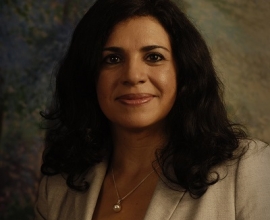EUROsociAL and social reintegration of incarcerated persons.
09/12/2014
PrintInterview with the Costa Rican Minister of Justice, Cristina Ramírez
On 15th and 16th December of this year, the ministerial conference “Improving the effectiveness of prison policies in Latin America: social reintegration of persons in conflict with the law” will be held in San José, Costa Rica. It will bring together the region's ministers of Justice and Government, international experts, and European authorities.
The forum is part of the “Social reintegration of convicted individuals with special attention to the occupational aspect of reintegration” project of EUROsociAL, which for the past two years has been promoting bilateral cooperation with 14 countries, as well as the joint creation at the regional level of tools and public policy documents. Among the documents to be approved is one called “Rules for reintegration of incarcerated persons”.
From EUROsociAL, we talked to Cristina Ramírez, Minister of Justice of Costa Rica, the country which will host this event, about the prison system in the region and its main challenges.
What is the status of the issue of prisons in the region, and what is its relationship to socio-occupational reintegration policies?
The prison issue is becoming increasingly important on the Latin American policy agenda, as it is one that presents growing problems related to the management and security of the countries of the region. Due to diverse factors, the prison issue has become an enormously complex policy area which in one way or another affects all the governments and which has decisive implications in the areas of security, human rights, government administration, and taxation.
Some countries are affected by especially pressing problems, such prison overcrowding, which has devastating effects on the quality of treatment given to inmates, in some cases affecting people's essential human rights. This situation is the result of very diverse factors, although no doubt the criminal justice policy of the countries has a very direct effect, including penal regulations, infrastructures, management processes, and prison treatment and social reintegration of incarcerated persons.
What is the expected outcome of this ministerial conference your country will be hosting?
It's a great opportunity for the governments of the countries to share our experiences and seek joint solutions that can guarantee compliance with human rights in our correctional facilities and, which moreover can have an impact on citizen security.
The objective of these rules is for Latin American governments to have new tools and to assume a series of commitments to improving prison policies so that they contribute to social cohesion. It's urgent that we adopt a preventive and inclusive approach in Justice policies. These documents that we're going to approve will represent a great step forward in the region in terms of strengthening public policies in this area.
The punitive and “get tough on crime” discourse is still very present in the region among the population, which makes it more difficult for rulers to promote preventive security policies that emphasise the socio-occupational reintegration approach for incarcerated persons. What can be done to fight this discourse?
The costs of lack of security in Latin America have been very high both in economic and social terms, and in public policy development. Some of the most important indirect costs of high crime rates have been the development of repressive policies focused on combating violence through deterrence. Nevertheless, the evidence shows that certain preventive actions have a direct, and a greater and more lasting, impact on violence at a lower cost than actions focused on deterrence or repression. This is the case of socio-occupational reintegration policies which, through building socio-occupational skills, aim to promote inclusion for incarcerated persons.
Clarifying the role of prisons as justice institutions is an enormously important task for the governments of Latin America. It is necessary to undertake this pedagogic work. By redefining the issue in this way, the activities aimed at socio-occupational reintegration, such as education and training programmes, become complementary to and compatible with the justice system. If prisons are more than places of confinement, socio-occupational reintegration programmes are essential for building just institutions.

